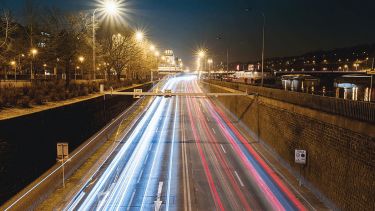The Urban Institute at the University of Sheffield focuses on the analysis and promotion of innovative thinking about the urban world today. The aim is to shape the cities of tomorrow, with research sitting within eight themes: automation and robotics, climate, co-producing urbanisms, controlled environments, infrastructure in action, life at the margins, urban riches and urban humans.
The Institute has been running for five years, with over 30 members working to find solutions to world challenges and engage in global discussions.
But has the scale and severity of global pandemic COVID-19 changed the perspective of what urban development and an ‘urban future’ might look like?
‘The context has changed, absolutely, and we need to look again at our previous assumptions and carefully adjust to this new urban context, and on a global scale,’ said Professor Simon Marvin, Director of the Urban Institute.
‘New questions have arisen because of coronavirus, like how do we intervene in a rapidly changing context where there are severe constraints on our ability to undertake fieldwork in person? And what can we say that is meaningful when we are still trying to make sense of the world around us?
‘We have had several discussions around these issues within the Institute, with our partners internationally and our researchers have been publishing think-pieces and editorials which reflect on the questions raised by the current crisis.’
Read the responses from Urban Institute academics below, from each area of expertise:
Bio-austerity and Solidarity in the COVID-19 Space of Emergency
Dr Michele Lancione and Professor AbdouMaliq Simone explore the implications of the retreat from busy to empty streets, the retreat to the safety of individual abodes and what this indicates about public sociality and the sense of the urban.
‘Recent [weeks] have witnessed many Western heads of state acting as pedagogues-in-chief, lecturing their populations that the nation is at war against an invisible enemy to which the majority has been seemingly oblivious and indifferent.’
Energy access and maintaining health in pandemics
Professor Vanesa Castan Broto discusses the role energy plays in responding to emergencies such as the COVID-19 pandemic, from ensuring adequate healthcare services to supporting households during lockdowns.
‘Protecting the renewable energy industry and its contribution to providing sustainable energy access for all must be an urgent priority for the current crisis.’
Ghost towns and crackdowns: the politics of urban COVID-19 control
Dr Tom Goodfellow focuses on the importance of cities in the response to coronavirus, stating that urban areas are seen as constituting the most threatening environments for the transmission of virus.
‘With cities like Dhaka and Manila – as well as specific informal settlements in cities like Nairobi and Cairo – harbouring some of the highest population densities in the world, prospects for urban public health are extremely disturbing.’
Detection and COVID-19
Detection now plays an increasingly important role in our lives. Professor AbdouMaliq Simone explores how the capacity to move, circulate, restore familiar patterns of work and sociality depend on the capacities to detect the presence of viruses, to detect trajectories of transmission, and surges and flattening of curves. The substantial elaboration of surveillance apparatuses is well underway.
COVID-19 and housing struggles: The (re)makings of austerity, disaster capitalism, and the no return to normal
The Radical Housing Journal write collectively on the centrality of housing and home to the COVID-19 crisis, to disentangle the key nexus between housing, the aftermath of the 2008 crisis, austerity, and the current pandemic, and connect current responses to longer-term trajectories of dispossession and disposability, bordering, ethno-nationalism, financialisation, imperialism, capitalism, patriarchy, and racism.
Containing Covid-19 – AI and Robotics in China
Bei Chen, Professor Simon Marvin and Dr Aidan While critically examine the intersection between COVID-19 management strategies and the technological affordances of robotics, autonomous systems, and artificial intelligence (AI) in urban pandemic control.
Learning from housing histories: Why we need to requisition property to address the pandemic
Dr Sam Burgum urges us to expand our notion of what’s possible in housing, with 20,000+ empty homes in Greater Manchester, 22,000+ across London and 226,000+ across England.
‘[We need to] make the best use of the resources at hand. One way we can do this is through requisitioning empty and under-utilised property, and there is a historical precedent for this in the UK.’

